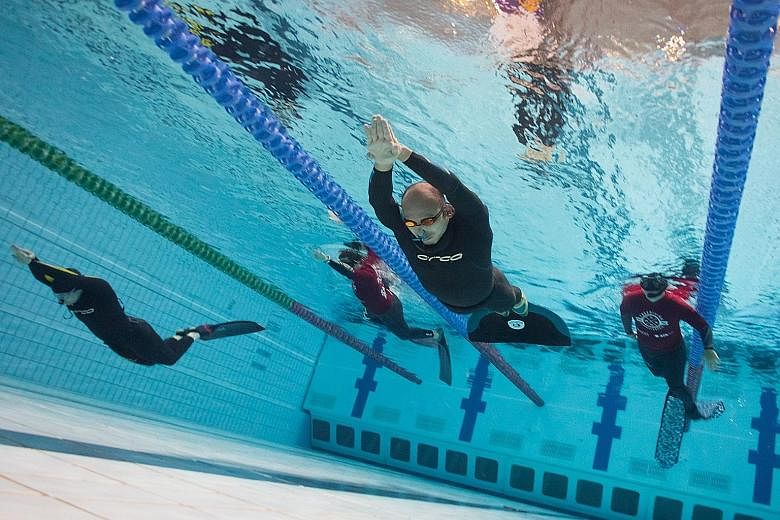Friends have written off their sport as simply holding one's breath.
Family, worried over safety, have discouraged them from participating. As a sport still in its infancy in Singapore, no more than 50 people here take part regularly.
But none of that prevented some of the Republic's top freedivers from doing well at one of the sport's most prestigious events, the Pan Pacific Pool Freediving Championships in Brisbane that ended in late November.
Michelle Ooi came third out of 17 competitors from 14 countries in the women's division while Valerie Chia was sixth. Together with Jonathan Chong, the three did well enough to place Singapore third out of 14 competing countries.
No mean feat, considering that the event included some of the top freedivers in the world, including world-record holders such as Alexey Molchanov (depth) from Russia and Amber Bourke (distance without fin) from Australia.
-
What is freediving?
-
As a sport, it is competitive breath-holding on a single breath.
Freedivers can compete in open water or in a pool, across three main disciplines - for depth, distance or time.
Disciplines
•Dynamic: Freedivers typically compete in a pool for distance, with or without the aid of fins
•Static apnea: Freedivers compete to hold their breath for as long as possible underwater. Conducted in a pool.
•Depth: Freedivers compete to dive as deep as they can on one breath, usually done in open water. Either done without fins, with fins, or pulling down with a rope.
"The sport is still very new in Singapore," said Jonathan Chong, president of the Apnea Association of Singapore (AAS).
"We did a lot better than we had expected, considering that the field was a very strong one."
The AAS was founded only this year. While it does not have National Sport Association (NSA) status under Sport Singapore, it is an affiliate of the Singapore Underwater Federation, the NSA that promotes diving and snorkelling.
Chong estimates there are about 300 people here who freedive recreationally while only a fraction are regular and elite athletes.
The local fraternity is hoping to capitalise on the momentum of the championship to introduce more people here to the sport - but also clear up misconceptions about it.
For starters, training to be a freediver does not simply involve holding one's breath - even if top local men like Chong can hold their breath underwater for more than six minutes.
Said the 28-year-old, who works in business development: "There are quite a lot of things to train for.
"On top of basic fitness, we train for (better body) tolerance of high carbon dioxide and low oxygen levels. We also do technique work and mental skills."
Chong and top freedivers here, for instance, train in and out of the pool up to five times a week.
Said Ooi, a 26-year-old veterinarian: "Very few know what freediving is, or understand the emotions and experience of freediving.
"Most people think it's just holding your breath, and a lot think that it's dangerous.
"But it's like driving a car or rock climbing. If you don't have the right safety measures in place or have no idea what you're doing, then those are dangerous too."
The sport has a low barrier to entry - a nose clip and any scuba diving mask are all one needs - and also offers benefits for athletes in other sports, added Chong.
He said: "The benefits of apnea are well documented in altitude training and its benefits cross into other sports.
"We hope to be able to go onto bigger events like the world championships and take on Asian powerhouses like Japan and Israel. We're already the top in South-east Asia - the next target is to go bigger."


